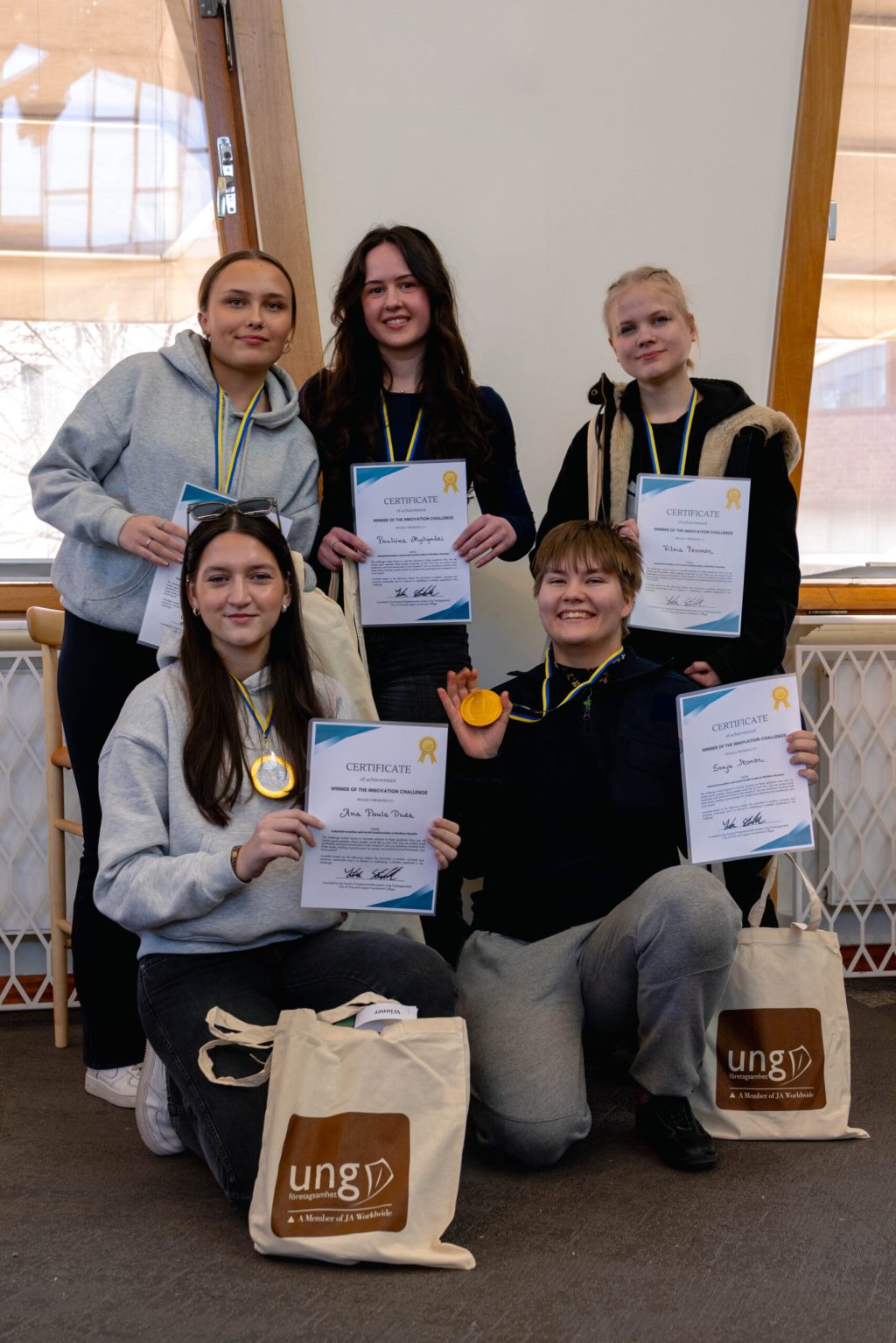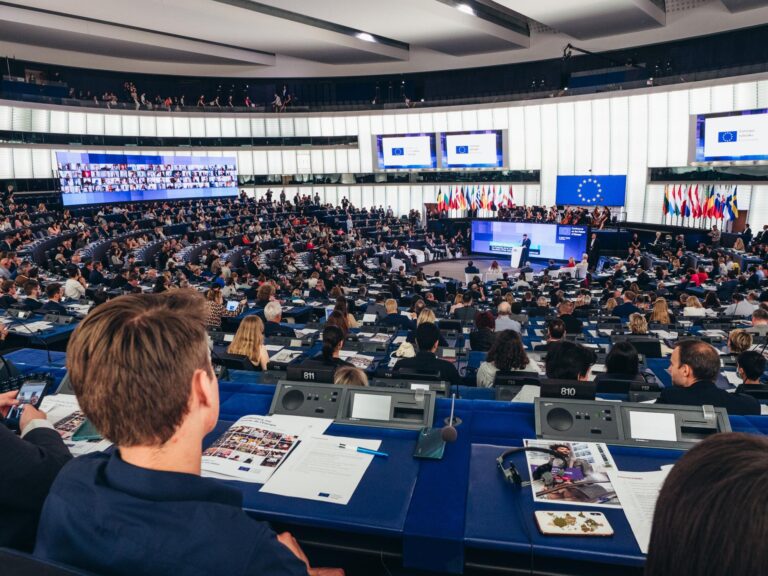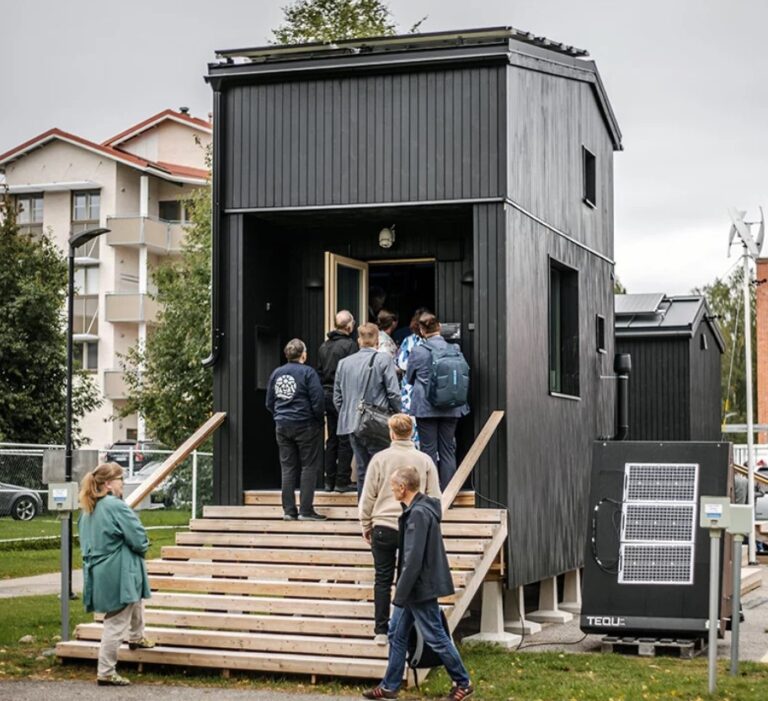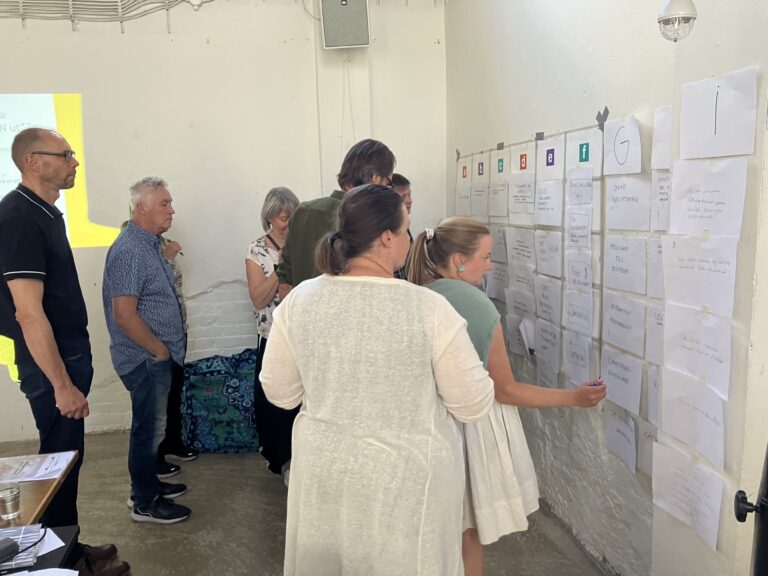Nearly 100 teachers and students from Northern Sweden and Finland worked together for three days on topics related to the green transition and societal change in Luleå (Sweden). Both teachers and students worked in mixed groups, using English as the common working language. The Innovation camp was organised by the Interreg Aurora funded project Aurora Entrepreneurialis.
The event began with a lecture by Dag Avango, a researcher in historical processes of change at Luleå University of Technology, who took participants on a journey through regional development and the events that have driven the development seen in the area today. Northern Sweden is undergoing a historical process of change, which is expected to bring 100,000 new residents to the area as the number of green transition jobs increases explosively. The changes affect every sector of society, and the region needs development ideas to address the challenges brought about by these changes. This is where the participants of the Innovation Camp also got involved.
Participants acquired knowledge and created new solutions
Participants worked during the days on two different tracks. On one track students learned more about the changes and they were visiting local stakeholders, from whom they learned about existing solutions and attitudes toward the region’s transformation. Teacher Jaana Stoor (Tornion yhteislyseon lukio), who participated in the event for the first time as part of the Aurora Entrepreneurialis project, found the visits inspiring and the topics of the event important:
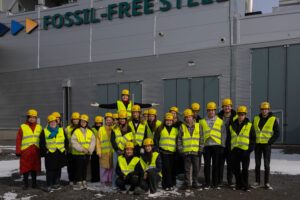
“It was especially nice to visit SSAB’s factory, as my uncle worked there his whole career, and I had heard a lot about the factory. The area is massive. It was also interesting to hear about the company Hybrit and their need to build a factory over 200 meters high to produce fossil-free steel. I also enjoyed the city tour on the second day and the fact that the short film from the textile rental shop on the first day became concrete during the visit to a similar organization (Butiken Samlat), where we saw firsthand how a clothing rental shop operates.”
Miina Happonen (Oulun Suomalaisen Yhteislyseon lukio), who was also participating in the project activities for the first time, found it particularly important that sustainable development was present both in the content of the event and in its practical implementation:
“As a first-timer, I have been able to network easily and flexibly. I have enjoyed working in our own teacher group, which in turn acted as a coach for the student group. I especially appreciate that sustainability has been taken into account in meals, with primarily vegetarian options available.”
In addition to gathering information and doing study visits, participants simultaneously worked on developing their own idea in the innovation competition. On the first day, they were given the choice to focus on creating solutions that promote people’s desire to settle, integrate, and thrive in the area or to focus on ways to protect biological diversity and the local environment. Student Helmi Aula (Haukiputaan lukio), who had participated in all events of the Aurora Entrepreneurialis project this academic year, found the three-day event successful:
“I have really enjoyed having a bigger project to work on. I have participated in all events of this academic year, and this 3-day innovation camp has been even more enjoyable than the 2-day ones because we have been able to settle in here somehow, and we haven’t had to leave for home the next day. Here we have been able to use creativity, learn perseverance, and also develop our own social skills. We have worked every day in our own mixed group, which includes both Finnish-speaking and Swedish-speaking students from different schools. Competition against other teams has been challenging but fun.”
Helmi worked in the same team with Petra Vänttilä and Irina Smed (Oulun Suomalaisen Yhteiskoulun lukio), who were participating for the first time. Both Petra and Irina highlighted that there was plenty of program, and there was no shortage of activities. Irina was happy about the themes the teams discussed with young people from different regions:
“I am participating for the first time, and it has been really nice to immediately start doing various things with new people. I have especially enjoyed discussing topics that we usually don’t talk about in everyday life. It has been nice to have shared activities here, but also some free time in between.”
For many participating students, this was a new experience working in mixed groups with Swedish and Finnish students: “These have been exciting days; we have met other students and made international contacts. It was good for the task to be able to discuss things from different perspectives,” summarized Vocational College Lappia students Iida Lukkarila, Miku Ukonaho, and Jerry Rantala. Eleanor Hannu and Filippa Mäki (Gränsälvsgymnasiet, Övertorneå) echoed similar thoughts:
“The days have been eventful, lots of new and fresh impressions. We didn’t know much about the changes in the area before, and we have never worked with people from other countries. So, we got new contacts and practiced English and Finnish.”
At the Innovation Camp = learning, developing and competing
The Innovation Camp organized by Aurora Entrepreneurialis project’s had three main goals:
- Participants learn about the extensive changes affecting the area and understand the complex sustainability issues involved.
- Participants use creative problem-solving skills to develop ideas and solutions to address the challenges facing the area.
- Teams practice and execute their own short film presenting their solution ideas.
On the third and final day, small groups condensed their ideas into a short film, from which the jury (Maja Alasalmi – Region Norrbotten, Jenny Lindberg – Luleå Municipality, Helena Sundberg – HYBRIT, and Roine Viklund – Luleå University of Technology) chose the winner of the entire innovation competition. The jury’s choice fell on the proposal “Learn and React,” developed by the student team: Vilma Pesonen, Sonja Ikonen, and Pauliina Myllymäki (Haukiputaan lukio, Oulu) and Felicia Sannerborg and Ana Paula Duda (Tornedalsskolan, Haparanda). The team’s solution to the challenge was to create a course targeted at young people, in which participants would learn first aid, promote physical and mental health, and learn various ways to help their fellow human beings. The course could also give participants confidence in crisis situations and promote safety in everyday life.
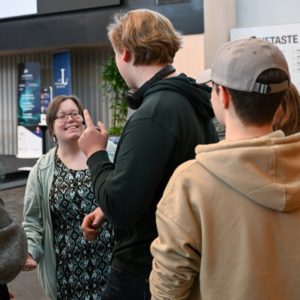
“We are very pleased with the results of the innovation competition. The students have worked well together and developed creative and interesting ideas. We are grateful to all the companies and organizations in Luleå that have welcomed us for visits and have helped in other ways to make our students and teachers feel welcome,” said project manager (UF) Linda Strandenhed.
The event concluded with a look into the future together with project coordinator Raija Paasimaa (Vocational College Lappia):
“It’s nice to look into the future after a successful event. We will meet again in Tornio in October 2024, where the theme of the 2-day event will be ‘Borderless North’. Thanks for this year, and see you at the beginning of the new semester!”
The Aurora Entrepreneurialis project aims to promote an entrepreneurial culture among secondary school students in the regions, further develop sustainable entrepreneurship education, and support institutions in cross-border cooperation. The project consortium consists of the City of Oulu, Ung Företagsamhet Norrbotten, and Vocational College Lappia. The project is funded by the Interreg Aurora program, with support from Region Norrbotten and Lapland Regional Council. The three-year project aims to develop entrepreneurship education in high schools in Northern Sweden and Northern Finland. Read more about the project here: https://www.ouka.fi/en/aurora-entrepreneurialis

